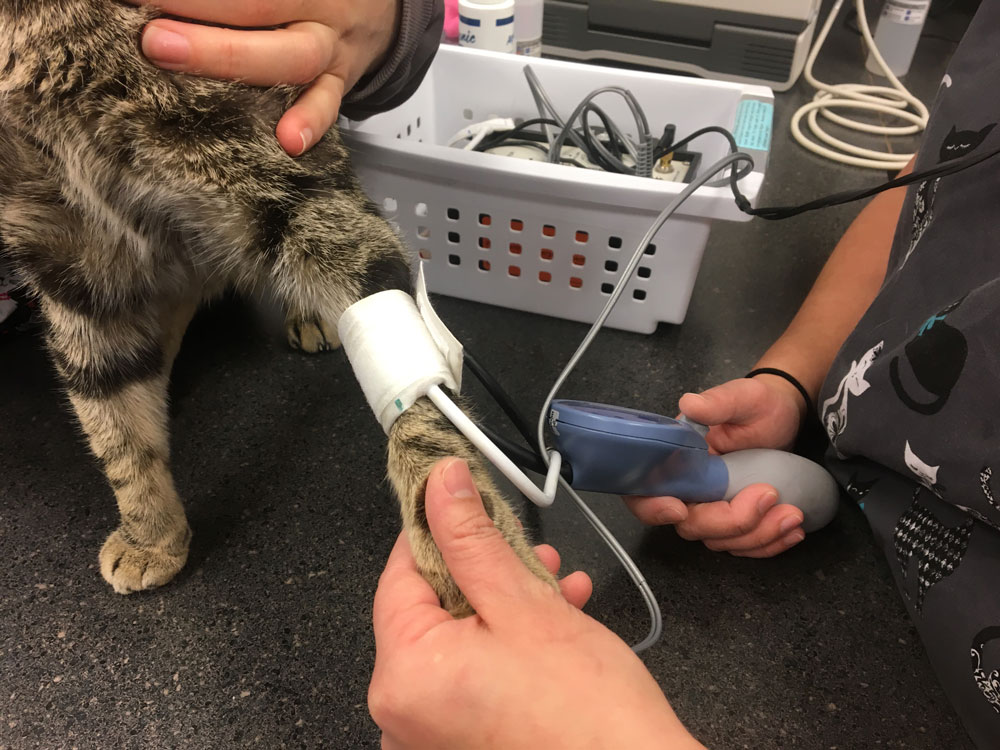In honor of American Heart Health Month, we wanted to talk about a problem that affects a large number of our feline friends – hypertension. We’ll talk about what it is, what it can mean, and how we treat it.

In honor of February’s Heart Health Awareness Month, we wanted to go into depth about a problem affecting a large number of our feline friends – hypertension. We’ll talk about what it is, what it can mean, and how we treat it.
High blood pressure (hypertension) is a common disease in both humans and cats. The condition is defined as occurring when the cat’s blood pressure is consistently higher than normal. Generally, that means above 175 mmHg. Hypertension most frequently affects older cats, and results from other underlying medical conditions. Chronic kidney disease is often such a cause, but there are also other diseases that can trigger hypertension, including hyperthyroidism and heart disease.
What are the clinical signs of hypertension?
In many cats, symptoms can be vague and difficult to catch at home. The most common ones include abnormal vocalization – for example, a normally quiet cat begins vocalizing at night – or agitation and difficulty settling.
In some cats, there are no signs until the hypertension has become somewhat severe. When the condition reaches that point, abnormalities in the cat’s vision are the most common indicators. Examples of these include dilated pupils that do not constrict with light, blood in the eye chambers and or blindness.
It may seem odd that blindness is a symptom of high blood pressure, but the loss of vision happens when the hypertension causes the retina to detach from the cat’s eye.
When the hypertension results from other underlying conditions, such as a heart, thyroid or kidney disease, the symptoms could include increased water intake, increased urination, vomiting and weight loss.
What are the effects of hypertension on the different organs?
If left untreated for a long time, high blood pressure damages a cat’s organs, especially those that are considered more vulnerable than others. Those include:
• The brain and nervous system: Hypertension can cause bleeding in these areas of the body, which can lead to neurological symptoms such as wobbly gait, dementia, seizures or coma.
• The eyes: As was mentioned above, High blood pressure can cause changes to and even detachment of the retina. This may result in sudden blindness.
• The heart: Because the heart has to work harder to pump blood, the muscle may thicken over time. In very severe cases, this could result in heart failure and difficulty breathing.
• The kidneys: In addition to being a symptom of chronic kidney disease, high blood pressure can also increase the risk of developing kidney failure. The small blood vessels in the kidney cannot withstand the high pressure and become increasingly more damaged.
How is feline hypertension diagnosed?

Because hypertension is only apparent at more serious stages, such as the sudden onset of blindness or neurological abnormalities, it is important to be proactive and get your cat’s blood pressure checked regularly. If your cat is older than seven, the checks should be performed twice a year at your senior cat exams since the disease is more common in older felines. In cats suffering chronic kidney disease, hyperthyroidism or heart disease, blood pressure should also be carefully assessed and monitored.
How is hypertension treated?
After determining that your cat is suffering from hypertension, we will try to address any complications that have occurred. Then we’ll assess whether the high blood pressure is caused by another disease. If the hypertension is due to an underlying disease such as chronic kidney failure, treatment of the main disease may also help control the high blood pressure.
If the hypertension is not secondary, anti-hypertensive drugs will likely be prescribed for your cat. Once your cat is on anti-hypertensive drugs, we’ll have to closely monitor its blood pressure and watch for any ocular changes.
What is the prognosis for hypertension?
Most cats with hypertension will need long term therapy and management. If the hypertension is not caused by any underlying disease, it is usually possible to manage and control the high blood pressure and prevent further complications to other organs. If the hypertension is caused by an underlying disease, the long-term prognosis depends on what kind and how severe the disease is.






